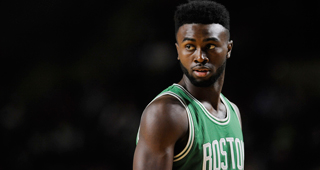There are different ways of expressing this. The Boston Celtics are inspirational and aggravating, well-coached and collegiately blank, industrious and smarmy, a hymn and a dirge. Like every franchise, they are a source of joy or headaches depending on where you’re sitting, but being not just any franchise—Russell, Red, Hondo, Larry, McHale, Pierce, Garnett, the Boston Celtics—and Boston itself standing in as a kind of obnoxiousness capital in a nation full of cities digging hard for that title, the conversation around them is typically pitched speakers-blowingly loud, and gets profane pretty quickly. Me? I’d probably like this squad a lot better if they were wearing Kings or Bucks uniforms. Anyway, this is beside the point. These Cus Crise Celts don’t beat themselves, and through gritted teeth or otherwise, there’s something to be said about that.
Gordon Hayward shattered his leg five minutes into the regular season and Kyrie Irving had knee surgery in April. Marcus Smart is playing with a semi-busted right hand. Jaylen Brown is carrying a mild hamstring injury and doesn’t totally look like his normal bouncy self. Shane Larkin is out with a bum shoulder—and that’s, like, a real problem. Jayson Tatum is a 20-year-old. Terry Rozier is averaging 37 minutes per game in the playoffs. Marcus Morris has an important offensive role. This is stuff everybody knows, but laid out of in full, it’s staggering what’s being overcome here.
Given the Cavaliers’ sharp decline and the Raptors cursed Raptocity, the Celtics would have cruised into the NBA Finals if they were healthy. That they are decidedly not and still have a great shot at taking down the Cavs is a function of Brad Stevens’s schematic genius, sure, but that’s not really what’s interesting about them if you’re not into closet optimization or rolling your own coins. What thrills and frustrates and delights and exhausts about the Celtics—what gets you to feel things about them—is what they are right now irrespective of what they could be if Hayward weren’t in street clothes: a team with obvious deficiencies that somehow never seems weak. Facts are facts—Terry Rozier isn’t Kyrie Irving, and Jayson Tatum is an astoundingly poised rookie, but he’s not Carmelo Anthony in his prime—and yet the Celts are astonishingly good at making you forget their predicament and instead focus your attention on what they do well, which is to say they’re persistent and don’t make many mistakes.
On its face, this is faint praise. The Warriors squads of recent years have not often been lauded for their sticktoitiveness, not for lack of that trait so much as—well, there is much more to Steph Curry’s game than hustle and knowhow. There’s more to Boston too. Al Horford reads the floor as well as nearly anyone else in the league. Brown is an otherworldly athlete with a ever-expanding grasp of the game. Rozier could start for quite a few teams. But if the Celtics weren’t extraordinarily disciplined on defense and didn’t labor as intensely as they do for good shots on offense, they wouldn’t scare anybody. Instead, their relentlessness renders them terrifying.
They won comfortably on Tuesday night and are headed to Cleveland with a chance to effectively end the series on Saturday. Game 2—more than Game 1, which was a straightforward drubbing—explained the sizable gap between the two teams, if not necessarily in talent, then in terms of focus and resolve. The Cavs got out to a seven-point first half lead on the back of a ridiculous shooting performance from LeBron James and an eleven-point second quarter from Kyle Korver. They moved the ball a little better than in Game 1; they hit some open shots they had previously missed.
And then they came out in the third period and just blandly and lethargically sucked, as they are wont to do. The Celtics stuck to their plan. They got into their offense early and ran multiple actions. They harassed ballhandlers; they closed out hard on shooters. To put it simply, they didn’t give up, but that’s not a simple thing: it’s difficult to play under control and stay sharp and fight through screens when the other team is outplaying you. Slowly, the Celtics ate into the Cavs’ lead, then started building one of their own. They were up by seven heading into the fourth quarter and didn’t look back.
The Cavs lost their heads after falling behind. Their rotations were slow. They threw the ball away. LeBron launched some long threes, as if to say if we come back on these shots, cool, but I’m not killing myself trying to drag you nothings to victory. J.R. Smith lost his head and shoved Al Horford as he was going up for a lob, and that was the end of that. The Celtics broke the Cavs, not with a brilliant performance, but with sustained effort.
The kick you get out of this depends upon where your allegiances lie, how much of a taste you have for exacting craftsmanship in your sports. (As opposed to, say, Vince Carterian spectacle.) This might sound like a non-sequitur, but I feel like your opinions on Corey Brewer have a lot to do with it. At any rate, what the Celtics are accomplishing is inarguably impressive, and also the only conceivable way that they could end up in the NBA Finals with a roster half-populated by guys with jacked up limbs. They are, as ever, going to work—indefatigably, rousingly, lamentably. They’re stoppable, but to defeat them, you have to stop them continually. Perhaps this is a sentiment around which everybody can unite: the 2018 Boston Celtics are an all-time pain in the ass of a squad. Amen, yuck, etc.



